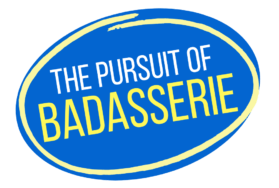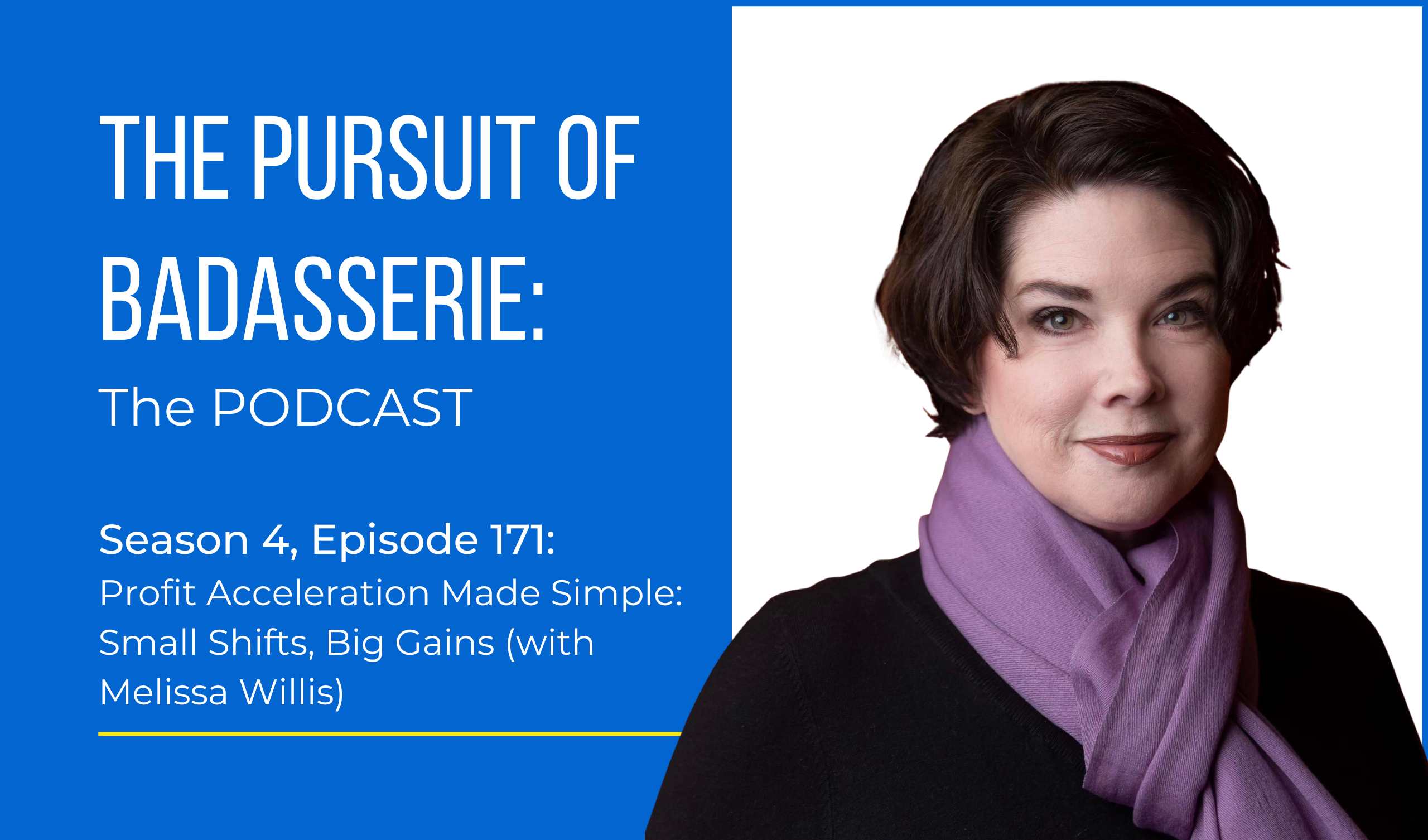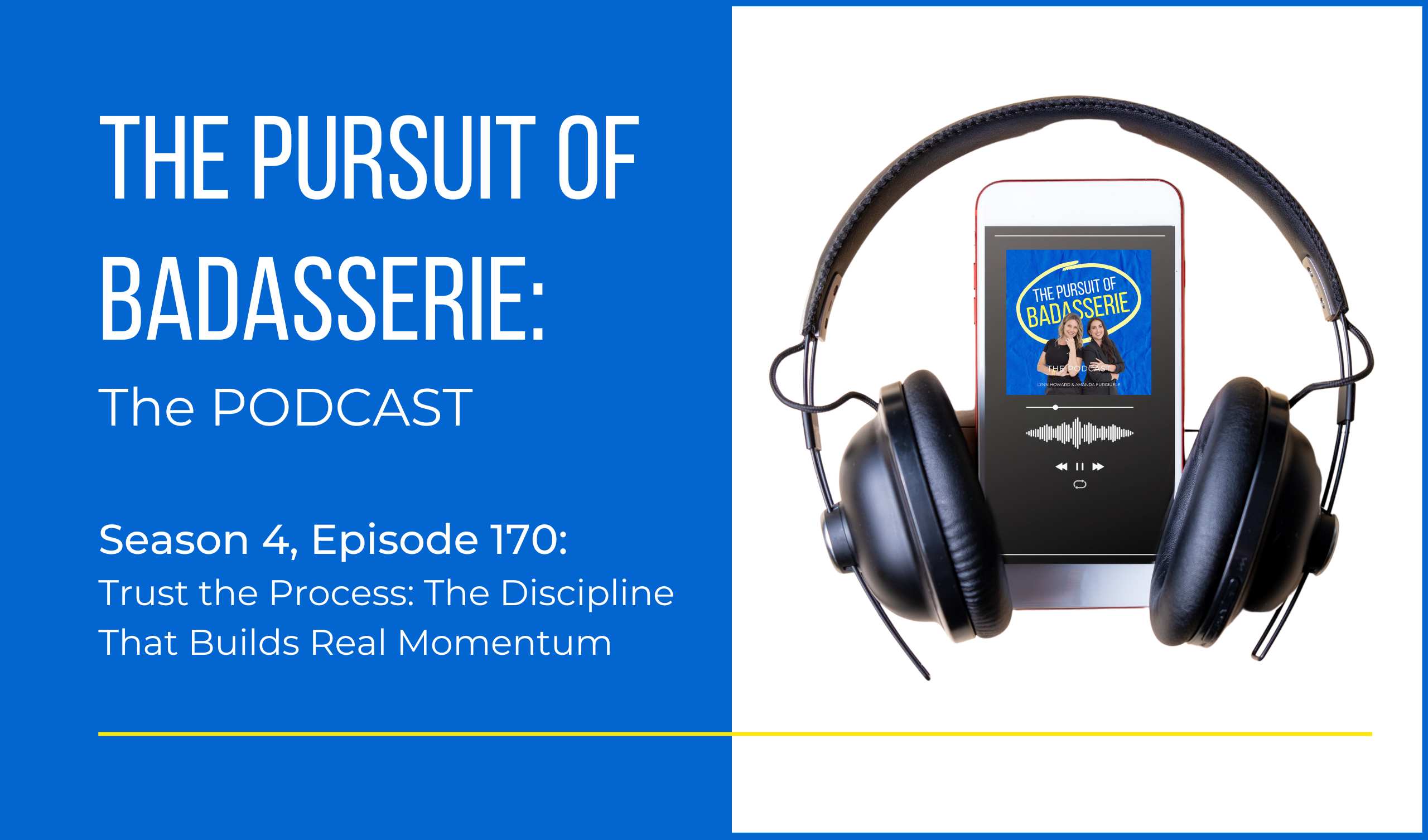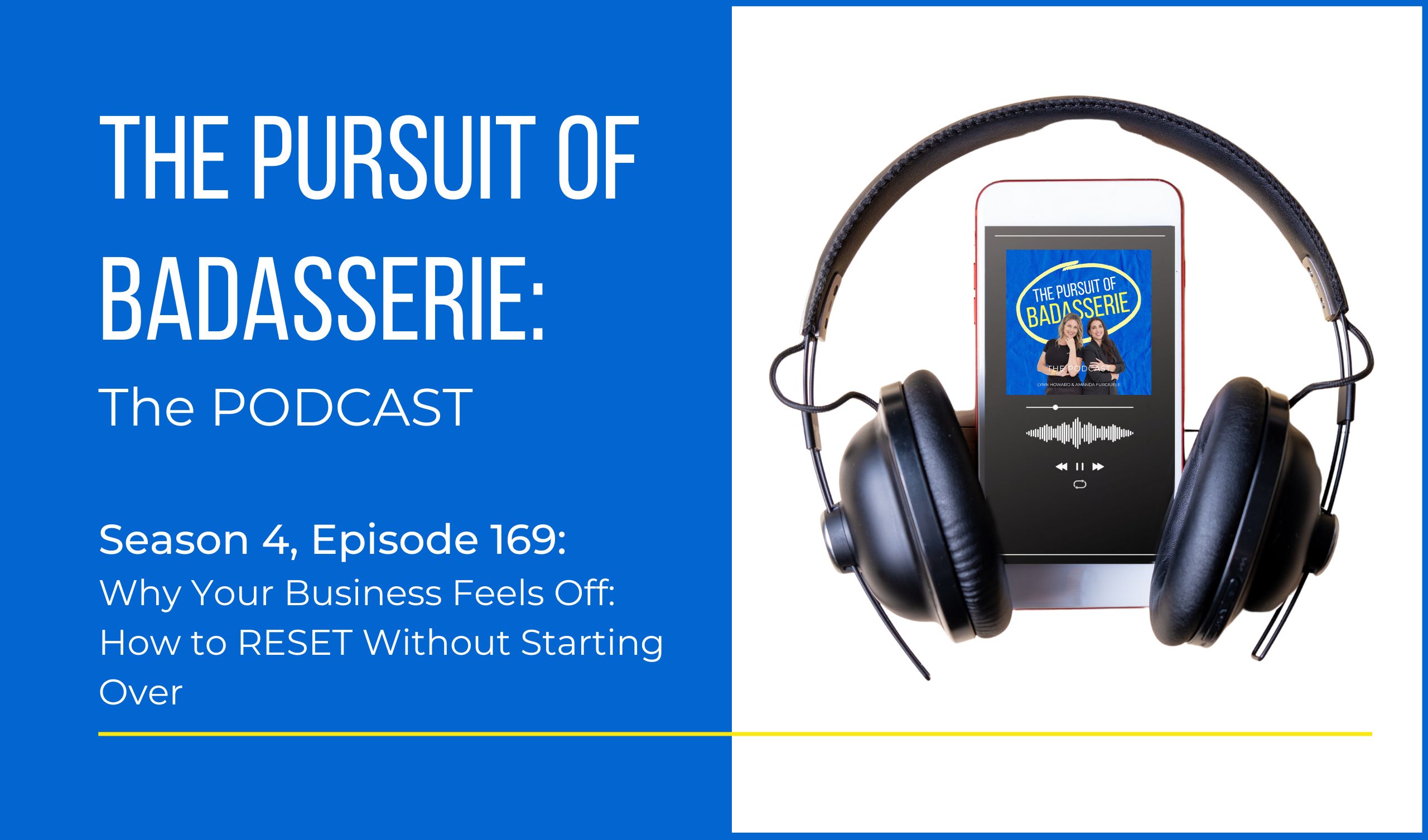Episode 149: Vacation-Proof Your Business: The Before, During & After Blueprint
Let’s be real: if your business can’t run without you for a week (or even a few days), you don’t actually own a business—you own a job. And jobs don’t give you freedom, flexibility, or the chance to truly step away.
In this episode, we’re pulling back the curtain on what it really takes to vacation-proof your business. From the before (setting up systems, testing your team, and letting them fly), to the during (actually stepping back, checking your ego, and resisting the urge to micromanage), to the after (reviewing what worked, what didn’t, and fixing the gaps), we’re giving you the blueprint for building a business that doesn’t collapse just because you unplug.
We don’t just preach it—we’ve lived it. We’ve been the control freaks, the martyrs, the ones who thought the world would stop spinning if we didn’t answer every email. Spoiler alert: it didn’t. And the sooner you train your business (and yourself) to run without you, the sooner you step into the kind of freedom you signed up for when you became an entrepreneur in the first place.
So, are you ready to stop being the bottleneck and start being the badass visionary your business actually needs? Press play, then go ahead and open that browser—because it’s time to start searching for flights.
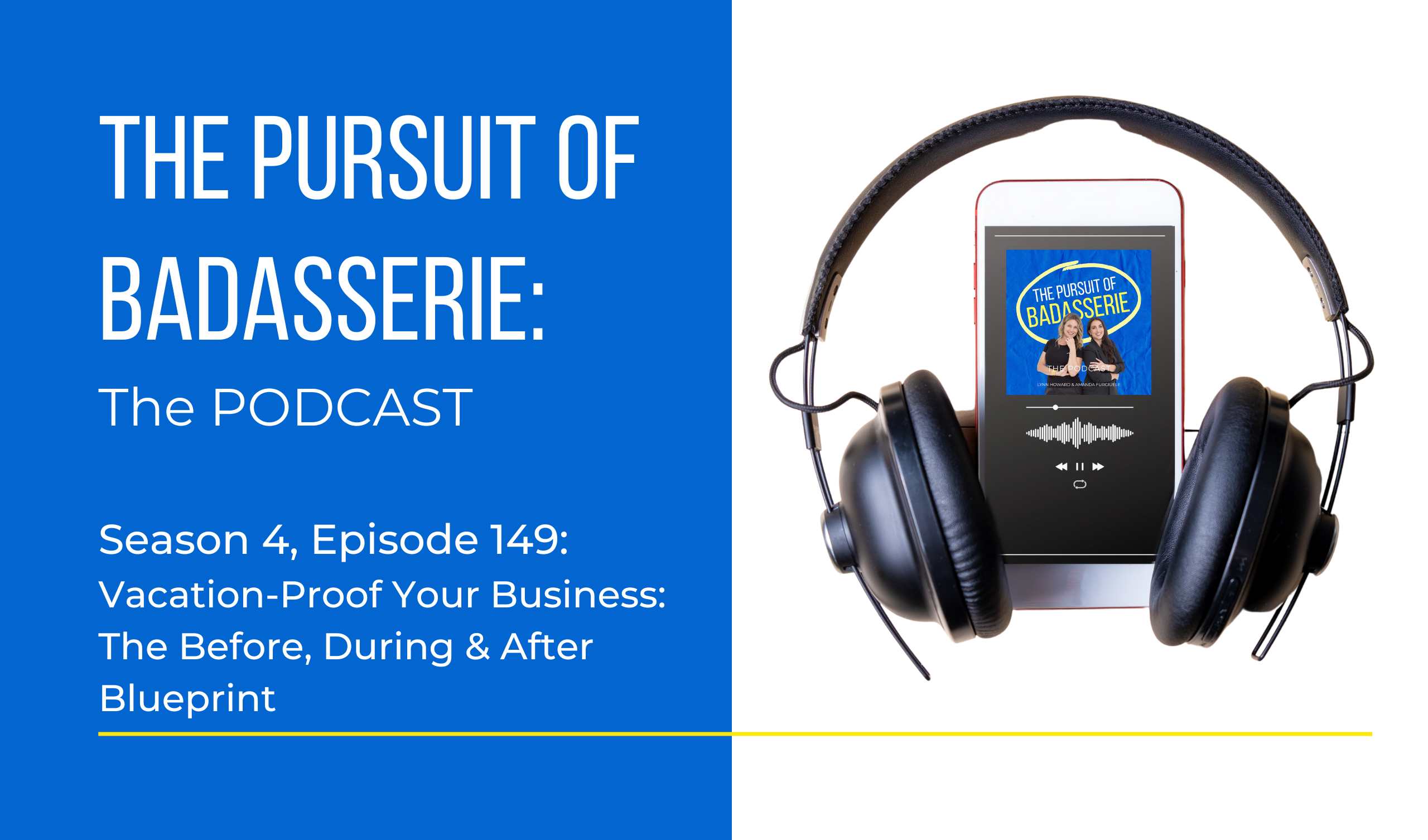
In this episode, we cover:
-
The “before” checklist: systems, SOPs, delegation, and dry runs
-
How to handle the “during”: discipline, ego-checks, and letting your team problem-solve
-
The “after” debrief: why reviewing fresh data beats rosy-colored hindsight
-
The mindset shift from martyr entrepreneur to badass leader
-
Why stepping away makes your business (and you) stronger
???? Ready to vacation-proof your business?
Listen now, then share this episode with a fellow entrepreneur who needs the reminder that freedom comes from letting go.
Make sure to subscribe to our YouTube or Spotify and leave us a review!
- Like the show? LEAVE US A REVIEW wherever you listen!
- Have a question? CONTACT US at info@thepursuitofbadasserie.com!
- Want to sponsor us? Find out how HERE.
…
Read the full transcript of this episode below:
Lynn
Hey, I’m Lynn.
Amanda
And I’m Amanda. Welcome to the Pursuit of Badasserie, the podcast. It’s kind of sad to see us in separate rooms.
I feel like I’ve been so used to being in the same room doing podcasts together. It’s so weird to see us in different countries again in different places doing other podcasts.
But today we are kind of talking about being in different countries and the concept of being away from your job, quote unquote.
Oh. are it? All Because we want to talk a little bit about what it means to step away from your business on those days that you do actually get a chance as an entrepreneur to leave your business, whether it’s brick and mortar or online, and do something else, whether it’s vacation or a family event or whatever, what does that look like to step away from your business?
Lynn
Yeah. You know, I think that there’s a before, a during, and an after kind of process with this. And if we dive right in, and you’ve heard Amanda and I talk about it so many times about your SOPs and your systems, and this is where they absolutely will come into play, you know, having that, the strong and understanding them, right?
So they’re not just in somebody’s head, they’re written down there, even if they’re bullet pointed, that’s okay, but that there’s some kind of like process, or system that other people know as well, and it’s not just in your head as a business owner.
Sure. Sure. Um, I think that it’s, you know, this is, we’re going to die on this hill. Always saying it, your systems and your processes are going to be your lifesaver or your, your killer here.
Amanda
Yeah, I feel like I’m not even going to say I’m going to die on this hill. Like I’m going to kill somebody on this hill because this is so important.
And I feel like I say it till I’m blue in the face. I feel like we say it all the time and like every interaction that we have.
And I love that you pointed out that there’s a before, big, like a bit during a before, during and after, because I think people don’t think about that so much.
They, they, they don’t plan properly or they think they’ve planned. And the things that they plan for are like these, I always like to say these unnecessary things.
Like these are never going to happen situations. Like they’re, they’re assuming the very, very worst is going to happen.
Lynn
going to
Amanda
And they’re making problems that don’t actually exist yet, and so really focusing on the SOPs that are the everyday, day-to-day things, and then when you’re in that mix, depending on the reason for your leaving on your trip, like, obviously there’s all sorts of various levels of, like, is this a vacation versus, like, are you actually checking out versus are you just traveling and working at the same time?
There’s a bit of difference there, but if you are checking out for vacation standard, like, actually do that, because if you don’t do the work of checking out, and sometimes it is work, like, we’re workaholics, we’ll work all living long day, so it is hard to check out and not work, I love working, I’ll work all day long, but if your goal is to check out, then actually do it, because the more that you check in, even though you’re checked out, the more you’re teaching everybody around you that you’re still accessible, and then you get resentful when they reach out to you, like, well, you’ve taught them how to do that, you’ve taught them how to do you’ve you’re available, and then in the aftermath, like, when you get back,
Take a really good look like what worked, what didn’t, because if everything fell apart when you were gone, then that’s all the things you need to make systems around like that’s the stuff that you didn’t set up properly before you left and it’s the best time as soon as you get back just kind of address that right then because it’s so fresh and new and you haven’t like forgotten and you know put on the rose colored glasses and like done the like quick checks to fix everything.
You you you’re sitting in it still so that’s the best time to go back through and see what’s working what’s not what happened while you were gone what actually happened while you were gone not what you thought was going to happen what actually happened and then you make the systems around that so I mean it’s systems letting go and then systems like control no control control kind of I guess it’s self discipline you know I was sitting here thinking about how different we approach it all the time.
I know, I know it’s your face.
Lynn
You’re like, oh, why are you going through all of it, Amanda? Like start with the before, then we’ll do the during, then we’ll do the after.
It’s a little thing between Amanda and I. I almost stopped the podcast, but I was like, it, we’ll roll with it.
So I’m going to go back to the before, because this is the way my brain works is, you know, and I agree with you that, that the systems, the letting go and then reviewing the systems like that’s actually a great formula in the beginning, though, it’s not only just building the systems, it’s testing them.
It’s the delegation of like, are, do the people understand what they’re supposed to be doing? Have you let them experiment and gain the confidence in themselves?
I literally was just doing a training a few weeks ago and somebody had been putting off his, we found out he put off his wedding too, but he was putting off his honeymoon.
For years, because he didn’t want to leave. And Matt, I literally wrote him a book on this little postcard that we were trying.
I was like, okay, you do this, you do this, you do this. So this is like right up the alley.
But one of the things is, is like, okay, so not only are the systems there, but have you tested them?
Have you done some dry runs? Have you done some practice plays? You know, that’s what you, you practice how you play, you play how you practice.
So have you weaned them off? Are you doing little, like things where you say, Hey, Bertie, go fly, and then we can review this.
And I, I think that that is really important for people to, to like, have that ability to be able to like, own their stuff, own the process.
And with that too, is also roles. You know, if the roles aren’t really, if they’re not known, if the roles aren’t very clear,
Or the who’s supposed to do what, even if it’s not underneath their role, maybe they’re kind of covering for someone, then it’s going to be a show.
And I actually remember when you ended up not being able to be too available because Houston had a hurricane.
And although we have all of the passwords, we have all this stuff, we saw some gaps of like, oh , like, if something happened to you, there were certain things that we didn’t know.
And same with, you know, if something happened to me, same thing if something happened to one of our team members.
And so we’ve been better about having these check-ins before we need them to say, okay, and we just told our team recently too, like, hey, we need to kind of clean some stuff up and do a check-in, but to make sure that those gaps aren’t happening, but our roles are understood, but also there’s kind of a little bit of cross-pollination and understanding of have each other’s roles.
It doesn’t mean that we’re doing them. But that we understand them.
Amanda
Absolutely. You know, and I like how you talk about the process of showing people how to do things and like getting that process done.
But I also think it’s really important. And maybe it’s all explained here for some people, but I’ve seen this happen in other businesses where you give them the process, they’re going through the process, but they’re so used to immediately falling back on you for the solution.
And you never let them kind of figure it out before you they come back to you that again, they even though they know the process, they don’t know how to troubleshoot the solution unless you spoon feed it to them.
And so and stuff that they’re not smart people.
Lynn
mean, you just trained them that that’s what they do as soon as they hit a roadblock train them to check the box and you didn’t train them to think I think that that’s really important.
Amanda
That’s a great point, too. Yeah, and it comes up in weird ways. And so I think it’s particularly if you know this trip is coming up, like, obviously, there are occasions where you were trips happen.
You aren’t expecting death in the family, things that happen that you can’t anticipate, but for the majority of the vacations that you take, you know, at least a couple of weeks, unless you’re like us, who leave in like a week, like two days notice, 12 hours, like, oh, we can get a plane real quick.
Unless you’re us, you have a little bit of headway, so you know that it’s coming, so you have that time to kind of work out the kinks and to let people take over and to train them on you not being there for the solution when things get harder, because there’s always something that’s going to come up that isn’t exactly cookie cutter to what the SOP has.
I mean, it’s an SOP. It’s not a run your entire life step by step. This is the way it’s going to be.
There’s no there’s no variation. That’s not what an SOP is. It’s going to be variation. So training your people on how to problem solve in the real world scenario is also part of that pregame that you do before you leave.
Lynn
I love it. I love it. OK, so the during you made a good. point earlier is like having, I would say the discipline of just like, not baby, not, and like, just going the discipline of going like stop thinking that the world revolves around you.
You need to be able to step yourself out and not be the solution to everybody’s problems, which we kind of just talked about or be the solution of everybody’s energy.
It’s funny when you were talking, I remembered a long time ago when I was area director for BNI. One of, um, one of the people I was working with, she said, sometimes you’re like a tornado in a good way.
She’s like, you come in and you like get everybody excited and get all this. But when you leave, it’s almost like you’re, you’re taking your energy with you and, um, and like a vortex type of thing.
And she says, it’s good in some ways, but it’s bad in others because you are, you shouldn’t be the end all to be all you need to, as much as you think you’re empowering, great.
Are you really, and so like being able to have that conversation and that discipline to step out and not jump in to correct, just allow, you know, mistakes are going to happen, you know, teach them how to fall forward a bit and also give yourself and give them a bit of grace to know that, you know, it’s a learning process.
And especially when you’re away, you know, it does change the dynamic of things. And so I think it also going back to a little bit before, but during is like being more concerned about the results, like the benchmarkers versus the process.
I know we talked about processes and SOPs, but look at like, instead of the time taken, look at the end result and like kind of the, that, those markers that you need to, but that discipline to be able to say, you guys got it.
I trust you not micromanaging, not blindly dumping and leaving them to just kind of fumble through it. But actually doing the prep, which is continuous prep, and then being able to have that step away.
Amanda
Yeah, I think it’s really, really, really hard for a lot of people. And I put myself in the same box because I know that in the olden days, pre, I don’t know, pre badassery days for sure.
I felt like it was, maybe it was a martyr syndrome almost, where it’s like, I am the only one who has the solution, and everybody falls apart without me, and I need to be there for my company, and I need to be the one that answers all these questions.
And it was a way to make myself seem more important, and it was a way to make myself seem more valuable, and that my life was more than it was.
And when it really came down to it, was just my poor management, because your business should run without you, it shouldn’t be about you, and I think that I got that twisted for a long time.
Because it was, this is my baby. And this is my business. And I want to be the thing that keeps it running.
And I’m such a quintessential part of the business. Well, no, I shouldn’t be I should hire better people, I should hire people who are better than me, so that they’re able to shine.
And I should put them in a place where they can shine. And that’s, so that’s a lot of control, you have to let go.
It’s a lot of this, like, you know, martyrdom and victimhood. like, I mean, there’s a lot of things that go into that.
And the control of being able to figure out every little thing and who’s doing what and what’s happening. When ultimately, like you said, it’s about the end result.
Like, what do I really want out of this trip? Like, what is the point of me going, if I’m just going to be there, but in a different zip code?
Like, what’s, what’s the point? So really, having that discipline and training your people around you, and then letting go of this feeling like, letting go your ego.
You’re not, you’re not that stuff.
Lynn
Yeah. Yeah. You know, I remember. What remember this saying is that if you’re always the answer, you’re going to always be the limit.
And I remember having this conversation when we really, with Ascentive especially, when everybody was building businesses globally and they were building them to rotate around them and only them and not have other people.
And so essentially, if you take yourself out, then you don’t have a business, you have a job, you have a responsibility that is only yours and it’s not something that will continue without you.
And so if your business can’t live 30 days without you, I’m not saying fully without you, although ideally you do want it to be able to live fully without you, then you’re not building a business that you can step away from ever.
And you’re just, it’s almost like you’re paying rent, versus having a home, right, and, or building a home and so not that there’s.
I wrong with that, but I know some people will get that analogy. Yeah. You know, the during is so important.
You just, you have to have the self-discipline. You have to understand that mistakes are going to happen. It’s just data.
People can learn from them. We don’t need to shame ourselves, beat ourselves up or them. You know, other people will do things differently.
That’s okay. And be more concerned about that end result, but you can’t micromanage and you can’t baby them or be the martyr.
Otherwise it’s not sustainable. And then the after, I mean, you already said it. Then the checks and balances, the celebrations, the looking at the processes, what worked, what didn’t, what do we need to strengthen?
Then, um, what did we learn during it? Because something new might come out of it. Um, instead of coming back stress, like you letting go, it’s not just letting.
running and the So that is absolutely an asset and a benefit to you, to your business, to the people that you work with.
100%.
Amanda
Absolutely. I think when you come back that first week, particularly the first week, if, let’s say, because I’m the pessimist in the group, let’s say hit the fan.
It was the worst. Everything fell apart. Nobody did their job. The world ended while you were gone. The first thing I want you to do is check yourself.
Is it your perception that everything? Yeah. And that the world came to an end? Or is it what actually happened?
Like, did you have to close your doors while you were gone? Or is it just that one thing, you know, fell behind by one day or so and so forgot how to do this and you had to tell them for the 400th time and you blow it up to be bigger than it really is, because people are still human.
And there’s going to be human error that still happens. So I want you first to check yourself because sometimes you come back and the ego gets in again.
And it’s like, well, if I had been there, this wouldn’t have happened. And I’m the only one clearly who can do it because this, this and this didn’t go exactly the way that I want it to go.
And that I always do it because I’m a control freak and I am only leading by my ego. And I say this because this was me.
So I can, I can riff on my own, on my own self, riff on Passamanda. That’s the first thing I want you to do, like really understand the difference between a systemic problem within your business.
Like what is the system that isn’t there versus you being the bottleneck and you freaking out because This one thing didn’t happen the exact way that you thought it was supposed to happen because you’re a control freak, okay?
And I know that’s really hard to say, but like I said, I’m only saying it because it was me and I have had that feeling where I come back and it’s like so many balls got dropped and I blow up and it’s like dramatic, the world cannot go on, this is why I never go on vacation dialogue, dramatic monologue, when really like nothing happened.
Nothing happened. There’s just small little things that you have to figure out and like tweak and change because a lot of times like, yeah, there’s stuff that happens, you can come back and there is a pile of on your desk, like that does happen, but usually it’s not life ending like traumatic stuff like, you know, you got audited and your building blew, you know, blew up and, you know, everybody died while you were out, you know, on vacation, like none of those things actually happened.
Almost never, mean, things have happened, but almost never, is that the case? So check yourself before you wreck your business.
Lynn
A hundred percent. Yeah, I’m reviewing all these past conversations in my head and, you know, Amanda and I are actually recording another podcast right after this about like workflow while you’re on the move, if you would.
And so this podcast is very different. This is about you taking time to check out, to replenish oneself, to not feel guilty about it.
It does take practice. It is difficult, especially for those of us who love what we do, who maybe are control freaks, recovering perfectionists, are used to being all up in the stuff.
Listen, Amanda and I are speaking from experience. Like it’s been a while. So it took a while for us to like, let go of that and build the right people around us to like, let’s be honest, because it is having the right people, not that the people in the past might not have been the right people.
They could have been, but maybe we weren’t in the right spot or vice versa. But to like absolutely have a business that you can be gone from either on vacation or God forbid something happens and it will continue to go.
Because I will tell you that vacations or either self-imposed or other imposed, you get to see things through a different eye.
Like Amanda was just traveling for a month. I’m traveling for a month and some of it’s vacation, some of it’s not.
And it gives me, I know for me, it’s given me the ability to slow down. But it’s also like I feel a bit of panic and guilt when I don’t see my schedule like packed to the brim.
And so then I have to ask myself, okay, why do I feel this way and what needs to change when I get back?
Because if, if my business could. So if run the way that it does and not have it like super jam packed or whatever, then am I really doing myself justice when I’m back and like filling all the things in?
So it gives you the ability to really kind of like, not just replenish, but also reevaluate the direction and the capacity in which you have.
Because guess what? If you don’t build a business that can live without you, then you have a job. You don’t have a business.
The second thing is, is that also you won’t replenish yourself. That means that most likely you’re heading for some kind of burnout.
You’re, you’re capping yourself at your capacity and your ability. So it’s on you.
Amanda
Yeah. What’s it going to be? How are you going to leave your vacation for your vacation? How are going to come back from it?
A lot of that is on you more so than, and I think we realized when we’re first in that earlier stage of entrepreneurship.
And when you’re so. And in it that you don’t see it until someone like us comes along and force it out.
You’re welcome.
Lynn
Absolutely. I think we’ve given you plenty of nuggets about the before, the during, and the after of taking a break from your business, going on vacation, setting up a business that you can absolutely step away from for a week, for a month.
And yeah, I think so.
Amanda
So I think now’s the time, now that we finished this episode, go ahead and open up your new browser, your incognito browser, and start looking for flights because it’s okay to take a vacation from your business.
Lynn
I agree. I agree. Put on those Google alerts. All right, so what would you add to the list? There’s lots of other things that we could have spoken about, about building a business that you can step away from, either for a vacation, self-imposed, or other-imposed, and not have the fret of what’s happening.to the have card Behind the scenes, what would you add to the list? And if you know someone who needs to hear this message, go ahead and share this podcast with them.
Hit that subscribe button as well. So that way you are in the know of all the other podcasts we release every week, a new podcast.
Amanda
All right. Until next time.
Lynn
Get after it.
